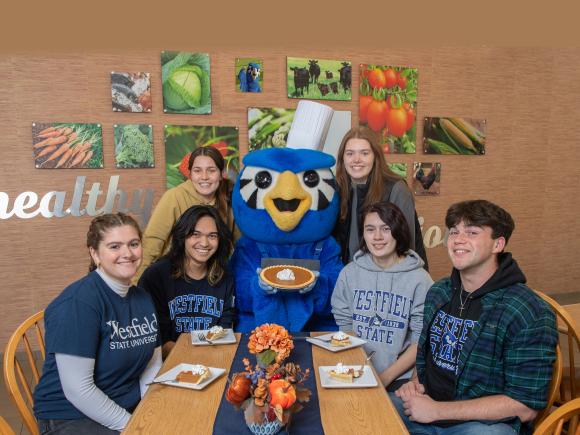
Recycling at Westfield State
Recycling: A Simple Step Toward a Healthier Future

Recycling is an important practice for both legal and environmental reasons. In Massachusetts, recycling has been required since 1990, with the state continuing to expand the list of materials that must be recycled (for more details, visit the MassDEP Waste Disposal Bans page). In 2021, the Massachusetts Department of Environmental Protection (MassDEP) set goals to reduce waste disposal to 4 million tons by 2030, with a long-term aim of cutting statewide waste by 90% by 2050.
At our University, all students and staff are expected to follow posted guidelines for proper waste and recycling disposal. Students responsibilities regarding waste/recycling can be found in the Student Handbook (see Section F. Facilities, page 118).
But beyond regulations, recycling is something we all can do to protect and improve the environment for today and for future generations. Together, we can make a positive impact!
How to Dispose of Waste and Recycle at WSU
Have questions about recycling in Massachusetts? Visit Recycle Smart.
In Residence Halls
Dorm rooms have a blue recycling bin for single-stream, easy-to-recycle products (plastic, glass, paper, cardboard), and a beige bin for non-recyclable trash.
When dorm bins are full, students should carry them behind the dorm for disposal. The yellow-lid dumpster is for recycled materials (no sorting required), and the black-lid dumpster is for non-recyclable ("household") trash.
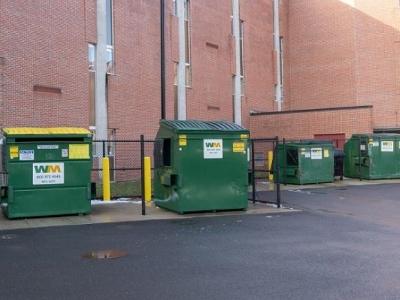
Dumpsters are picked up twice a week during the school year for recycling and waste disposal.
In shared dorm spaces (lounges, kitchens), look for the blue and beige bins to properly dispose of waste!
Move-Out Day Give and Take: Students should follow Move-Out Day instructions/signs for disposing of recyclable and reusable materials.
In Academic/Administrative Buildings
Most hallways have yellow-lidded bins for single-stream recycling and tan /black circular cans for all other trash.
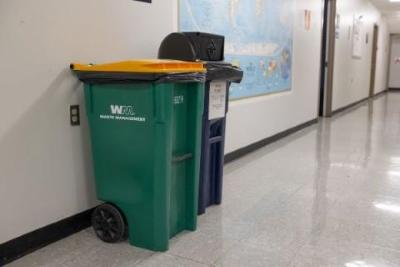
Some hallways have a variety of bins designated for recycling and trash – please follow instructions on posted signs.
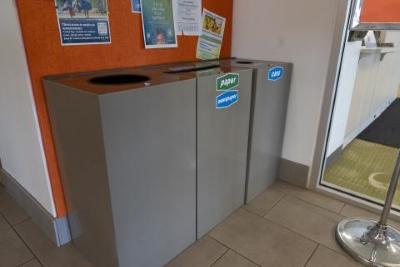
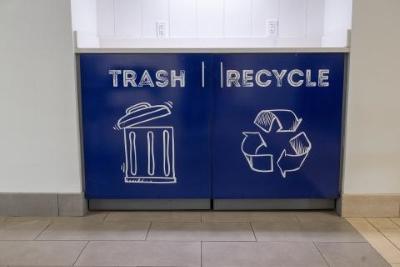
Classrooms have a black/beige bin for trash and recyclables should be taken to the hallway yellow-lidded bins.
For your convenience, some classrooms have a blue recycling bin.
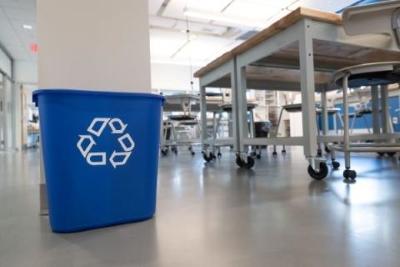
Office materials for recycling (plastic, glass, paper, cardboard) should be taken to the yellow-lidded recycling bins in the hallways. Each office’s black/beige bin should be used for trash.
In the evenings, these bins are picked up for waste disposal and recycling.
A container for used batteries is available in or near most offices.
In the Dining Commons
After eating, students place all waste (plates, cups, napkins, uneaten food, etc.) on the conveyor belt in the return area. Staff sorts the materials (washable, recyclable, compostable, or throw-away) and disposes of them properly. Take-out containers, when available, should be used for carry-out food and disposed of properly (as recycling or waste).
What is washable?
- Plates
What is recyclable?
- Single-stream recycling: coffee cups and lids, napkins, plastic, glass, cardboard.
What is composted?
- Food waste, some cups, tea bags and packaging, utensils, and some trash bags.
What is thrown away?
- Trash, plastic gloves.
What is reused?
- Used cooking oil sent to an external party for processing/reuse.
On Campus Grounds
Bins for trash are located outside or at the entryways of most campus buildings.
Recyclable materials should be carried into the building hallways and disposed of in yellow-lidded bins or taken to recycling dumpsters behind the dorms.
What We’re Working On
- Comprehensive Electronic Waste (e-waste)
- Textiles collection, recycling, and disposal